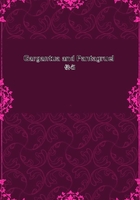
第338章
How Gaster invented an art to avoid being hurt or touched by cannon-balls.
Gaster having secured himself with his corn within strongholds, has sometimes been attacked by enemies; his fortresses, by that thrice threefold cursed instrument, levelled and destroyed; his dearly beloved corn and bread snatched out of his mouth and sacked by a titanic force;therefore he then sought means to preserve his walls, bastions, rampiers, and sconces from cannon-shot, and to hinder the bullets from hitting him, stopping them in their flight, or at least from doing him or the besieged walls any damage. He showed us a trial of this which has been since used by Fronton, and is now common among the pastimes and harmless recreations of the Thelemites. I will tell you how he went to work, and pray for the future be a little more ready to believe what Plutarch affirms to have tried. Suppose a herd of goats were all scampering as if the devil drove them, do but put a bit of eringo into the mouth of the hindmost nanny, and they will all stop stock still in the time you can tell three.
Thus Gaster, having caused a brass falcon to be charged with a sufficient quantity of gunpowder well purged from its sulphur, and curiously made up with fine camphor, he then had a suitable ball put into the piece, with twenty-four little pellets like hail-shot, some round, some pearl fashion;then taking his aim and levelling it at a page of his, as if he would have hit him on the breast. About sixty strides off the piece, halfway between it and the page in a right line, he hanged on a gibbet by a rope a very large siderite or iron-like stone, otherwise called herculean, formerly found on Ida in Phrygia by one Magnes, as Nicander writes, and commonly called loadstone; then he gave fire to the prime on the piece's touch-hole, which in an instant consuming the powder, the ball and hail-shot were with incredible violence and swiftness hurried out of the gun at its muzzle, that the air might penetrate to its chamber, where otherwise would have been a vacuum, which nature abhors so much, that this universal machine, heaven, air, land, and sea, would sooner return to the primitive chaos than admit the least void anywhere. Now the ball and small shot, which threatened the page with no less than quick destruction, lost their impetuosity and remained suspended and hovering round the stone; nor did any of them, notwithstanding the fury with which they rushed, reach the page.